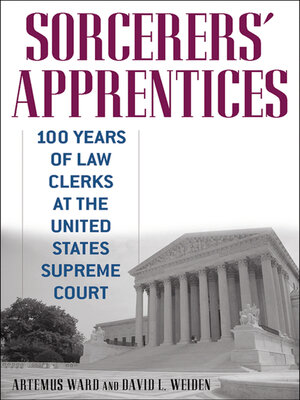Sorcerers' Apprentices
ebook ∣ 100 Years of Law Clerks at the United States Supreme Court
By Artemus Ward

Sign up to save your library
With an OverDrive account, you can save your favorite libraries for at-a-glance information about availability. Find out more about OverDrive accounts.
Find this title in Libby, the library reading app by OverDrive.



Search for a digital library with this title
Title found at these libraries:
| Library Name | Distance |
|---|---|
| Loading... |
Law clerks have been a permanent fixture in the halls of the United States Supreme Court from its founding, but the relationship between clerks and their justices has generally been cloaked in secrecy. While the role of the justice is both public and formal, particularly in terms of the decisions a justice makes and the power that he or she can wield in the American political system, the clerk has historically operated behind closed doors. Do clerks make actual decisions that they impart to justices, or are they only research assistants that carry out the instructions of the decision makers—the justices?
Based on Supreme Court archives, the personal papers of justices and other figures at the Supreme Court, and interviews and written surveys with 150 former clerks, Sorcerers’ Apprentices is a rare behind-the-scenes look at the life of a law clerk, and how it has evolved since its nineteenth-century beginnings. Artemus Ward and David L. Weiden reveal that throughout history, clerks have not only written briefs, but made significant decisions about cases that are often unseen by those outside of justices' chambers. Should clerks have this power, they ask, and, equally important, what does this tell us about the relationship between the Supreme Court’s accountability to and relationship with the American public?
Sorcerers’ Apprentices not only sheds light on the little-known role of the clerk but offers provocative suggestions for reforming the institution of the Supreme Court clerk. Anyone that has worked as a law clerk, is considering clerking, or is interested in learning about what happens in the chambers of Supreme Court justices will want to read this engaging and comprehensive examination of how the role of the law clerk has evolved over its long history.







